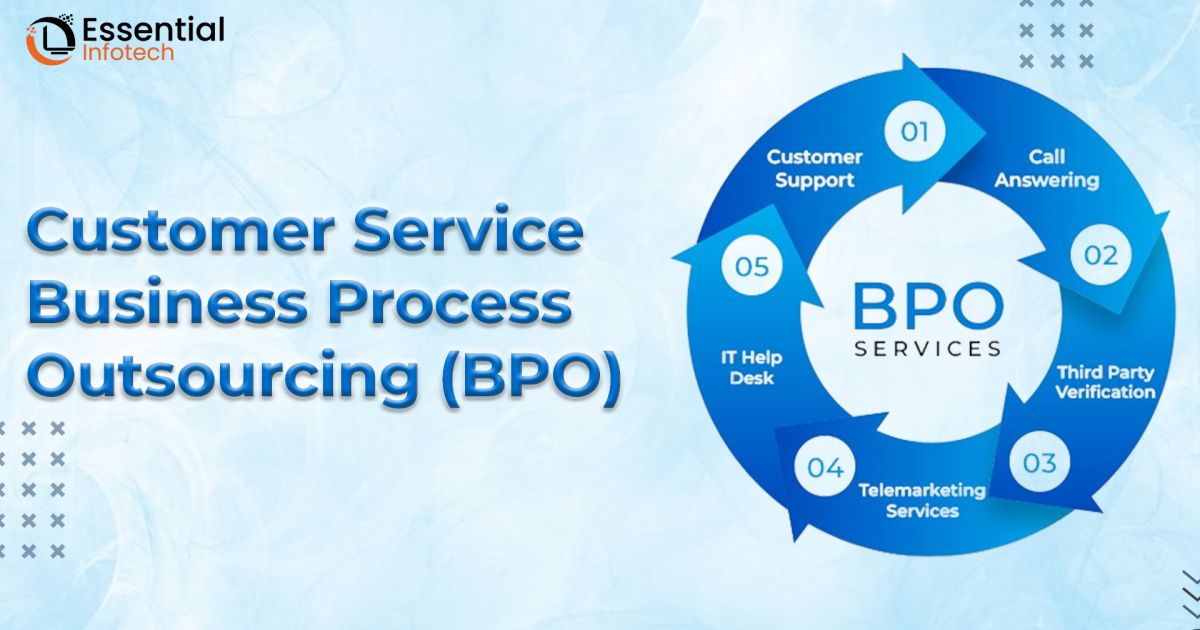

Business Process Outsourcing (BPO) is the practice of contracting third-party service providers to handle various business operations and processes. These processes can range from customer support and IT services to accounting and human resources. BPO allows companies to focus on their core competencies by delegating non-core functions to specialized firms, often resulting in cost savings, enhanced efficiency, and access to global talent. This strategic move helps businesses streamline operations, improve service quality, and adapt quickly to changing market demands.
in today's highly competitive business landscape, delivering exceptional customer service is paramount. Companies increasingly turn to Business Process Outsourcing (BPO) for their customer support needs. But why should you consider outsourcing, when is the right time to do it, and how should you go about it?
This article delves into the reasons, timing, and methods for outsourcing customer support to a BPO provide:
⬇
Why Outsource Customer Service?
1. Cost Efficiency:
Outsourcing customer service can significantly reduce operational costs. Hiring, training, and maintaining an in-house support team can be expensive. BPO providers offer scalable solutions that can lower expenses by leveraging economies of scale and operating in regions with lower labor costs.
2. Access to Expertise:
BPO companies specialize in customer service and have vast experience across different industries. They bring best practices, advanced technologies, and skilled professionals to ensure high-quality service. This expertise can be particularly valuable for companies lacking the resources or knowledge to build an effective support team internally.
3. Focus on Core Competencies:
By outsourcing customer support, businesses can focus on their core competencies, such as product development, marketing, and sales. This allows companies to allocate more resources and attention to areas that directly contribute to growth and innovation, while leaving customer service to experts.
4. Enhanced Customer Experience:
BPO providers often operate 24/7 and offer multilingual support, catering to a global customer base. This round-the-clock availability ensures that customers receive timely assistance, enhancing their overall experience and satisfaction. High-quality customer service can lead to increased customer loyalty and retention.
5. Scalability and Flexibility:
Outsourcing offers the flexibility to scale operations up or down based on demand. During peak seasons or promotional campaigns, BPO providers can quickly ramp up support to handle increased customer inquiries. Conversely, they can scale down during slower periods, optimizing resource utilization and cost efficiency.
When to Outsource Customer Service?
1. Rapid Growth and Expansion:
When a company is experiencing rapid growth, it can be challenging to keep up with the increasing volume of customer inquiries. Outsourcing provides a scalable solution to manage this growth without compromising on service quality.
2. High Customer Support Demand:
Businesses with high customer support demand, such as e-commerce, travel, and telecommunications, often benefit from outsourcing. BPO providers can handle large volumes of queries efficiently, ensuring that customers receive prompt and effective assistance.
3. Limited Internal Resources:
Small to medium-sized enterprises (SMEs) and startups may lack the resources to build and maintain an in-house support team. Outsourcing allows these companies to offer professional customer service without the associated overhead costs.
4. Seasonal Fluctuations:
Industries with seasonal fluctuations, like retail and tourism, can struggle to manage varying levels of customer inquiries. BPO providers offer the flexibility to adjust support levels according to seasonal demands, ensuring consistent service quality year-round.
5. Need for Multilingual Support:
For businesses operating in global markets, providing multilingual support can be a challenge. BPO companies often have multilingual agents who can cater to diverse customer bases, improving communication and customer satisfaction.
How to Outsource Customer Service?
1. Define Your Objectives and Requirements Before outsourcing, clearly define your objectives and requirements. Determine what aspects of customer service you want to outsource, such as phone support, email support, live chat, or social media management. Establish key performance indicators (KPIs) and service level agreements (SLAs) to measure success.
2. Choose the Right BPO Partner Selecting the right BPO partner is crucial for the success of your outsourcing initiative. Evaluate potential providers based on their experience, expertise, technology, scalability, and cultural alignment with your business. Look for references and case studies to assess their track record.
3. Develop a Detailed Contract Create a detailed contract outlining the scope of work, performance expectations, pricing structure, and confidentiality agreements. Ensure that the contract includes provisions for regular reviews and adjustments based on changing business needs.
4. Implement Effective Communication Channels Establish clear communication channels between your company and the BPO provider. Regular meetings, performance reviews, and feedback sessions are essential to ensure alignment and address any issues promptly. Use collaborative tools and platforms to facilitate seamless communication.
5. Invest in Training and Knowledge Transfer Even though BPO providers have expertise in customer service, it’s important to invest in training and knowledge transfer to familiarize them with your products, services, and brand values. Provide comprehensive training materials and ongoing support to ensure they represent your company effectively.
6. Monitor Performance and Continuous Improvement Regularly monitor the performance of the BPO provider against the established KPIs and SLAs. Use analytics and reporting tools to track metrics such as response times, resolution rates, customer satisfaction scores, and feedback. Continuously work with the BPO partner to identify areas for improvement and implement best practices.
7. Maintaining Customer Data Security Customer data security is paramount when outsourcing customer service. Ensure that the BPO provider adheres to stringent data protection regulations and has robust security measures in place. Conduct regular audits and assessments to verify compliance and safeguard sensitive information.
Outsourcing customer service to a BPO provider can offer numerous benefits, including cost efficiency, access to expertise, enhanced customer experience, and scalability. It is particularly advantageous for businesses experiencing rapid growth, high customer support demand, seasonal fluctuations, or the need for multilingual support. By defining clear objectives, choosing the right partner, and implementing effective communication and monitoring strategies, companies can successfully outsource their customer support operations, allowing them to focus on their core competencies and drive business growth.
https://www.linkedin.com/company/essential-infotech/mycompany/
We Are A Leading IT Company Experienced In Creative And Innovative Development And Design Solutions .